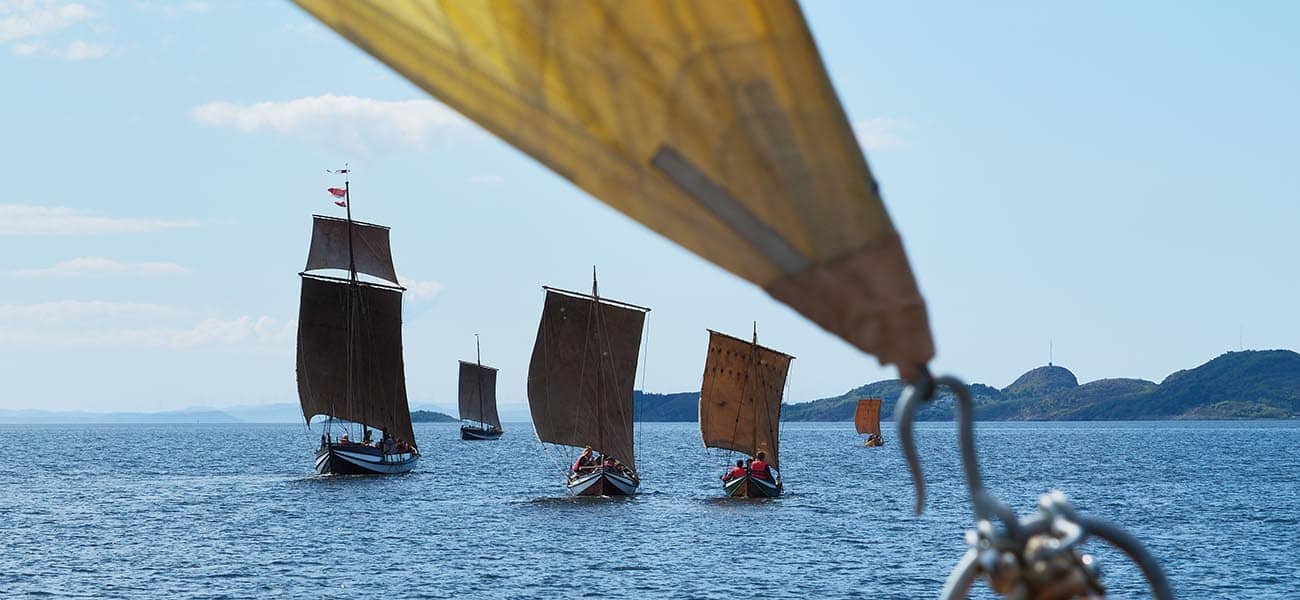
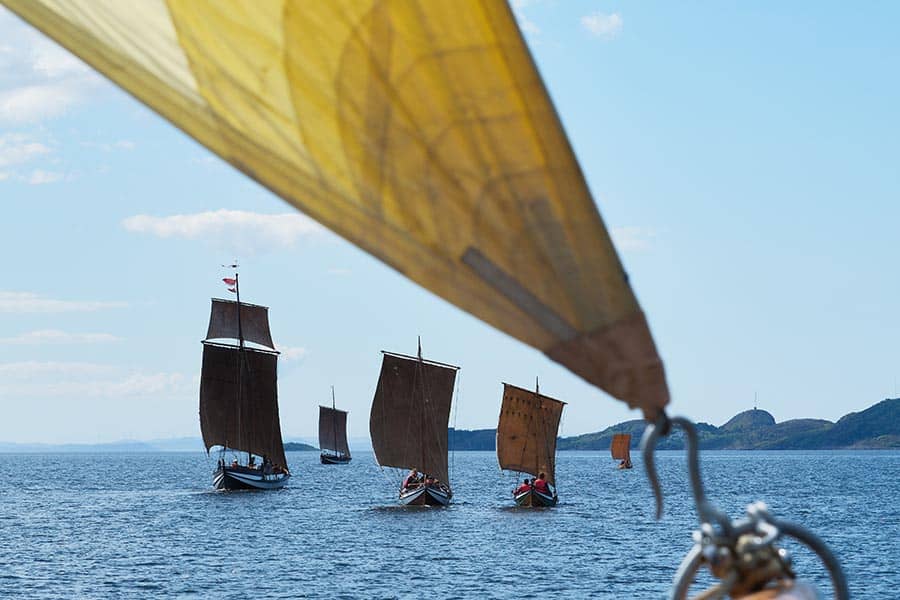
Early Days at Fosen Folk School
SNIPPETS FROM A STUDENT JOURNAL
By Annika Svorkdal
Student 2017/2018
August 2017
SATURDAY. I stepped out of the plane into Trondheim's coastal air. I found my way through the airport, and with the help of some very friendly bus drivers, I found a ride into town.
We drove through the country on a road that overlooked rows & rows of classic Scandinavian houses -barn red with white trim and crisp gardens- huddled against the sea. Rain clouds moved in and put a bit of a 'damper' on my trek to the hostel. I made it safely, with all my things, and was greeted by a warm shower and comfy bed.
But it is hard to fall asleep. I have a knot in my stomach and I feel very far away from home.
SUNDAY. I woke up at a surprisingly reasonable time. Jetlag hasn’t caught up with me yet. I found some other travellers and we found our way to town through a rainstorm. In an amusing blend of Finnish, German, Norwegian, and English we navigated the streets.
Everything was eerily quiet, and we soon figured out Norway is closed on Sundays. So, I scratched my plans of school supply shopping (aka finding rubber boots and a lifejacket).
We walked up and down the cobbled streets, motivated by our stomachs, to find something that was open. Sure enough, we came upon (or perhaps 'pounced upon' is more realistic) a little corner store and loaded up with an interesting assortment of foods I cannot pronounce (yet).
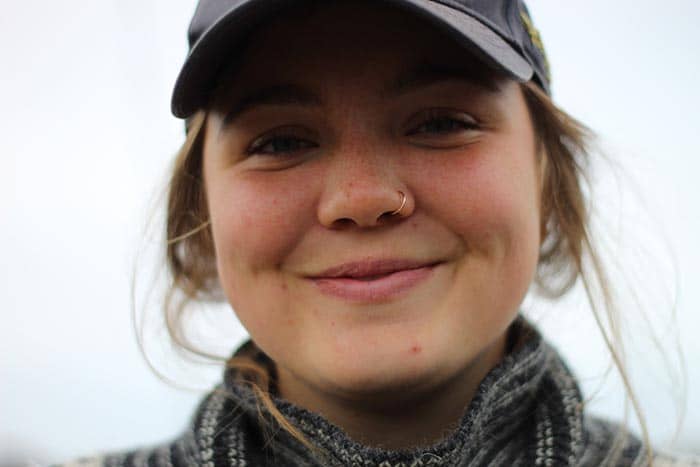
MONDAY. With all my belongings in tow, I navigated my way through Trondheim. And, as I was crossing the street a girl with dirt under her fingernails and the distinct look of someone who had been working hard, smiled broadly at me.
When on the bus some hours later, we stopped to pick up more passengers and the same girl, hopped on and sat beside me. "Fosen?" she asked. And when I said yes, she looked so excited she could burst.
Julia was the first person I met from Fosen, she is a second year from Denmark who knows a Fosen student when she sees one. Her warm welcome was consistent with each and every person I met today.
After just an hour of being here, I already felt settled. The hallways are filled with the sounds of fiddle, guitar, and accordion.
The knot in my stomach is already starting to untangle. This evening we kicked off the year with folk dancing and catching up on the last 20 years of our lives.
TUESDAY. We came down for breakfast and piled into the dining room. Rubbing the sleep out of my eyes, I navigated the buffet of unfamiliar foods and sat down with a boisterous crowd of Danes who had already been for a morning swim in the lake.
I followed the flow of the group up to the assembly room and then around the school grounds for orientation. We toured the sauna, the apple trees, the workshops and then through the town and down to Nøst.
Nøst is our small farm, near the shores of Botn. It has fields of barley, hay, and rye, potatoes as far as the eye can see, families of pigs and ducks, rows of vegetables, and a small house with a wood stove.
My farming class will be spending most of our time at Nøst, bringing the land through its seasonal rotations from sowing to harvest. We will also go beyond our own fences and visit local farms with traditional techniques.
After we were acquainted with the farm, a group of us decided to take a closer look at the lake. We stripped down and jumped in to wash away the layer of sweat and stress from traveling. It was exactly what I needed. I think we will make it a daily routine.
This evening we are sitting around a fire. Some people are knitting and others carving. Beside me, Amalie is receiving a funky new haircut. There is a buzz from our chatting and a crackle from the fire.
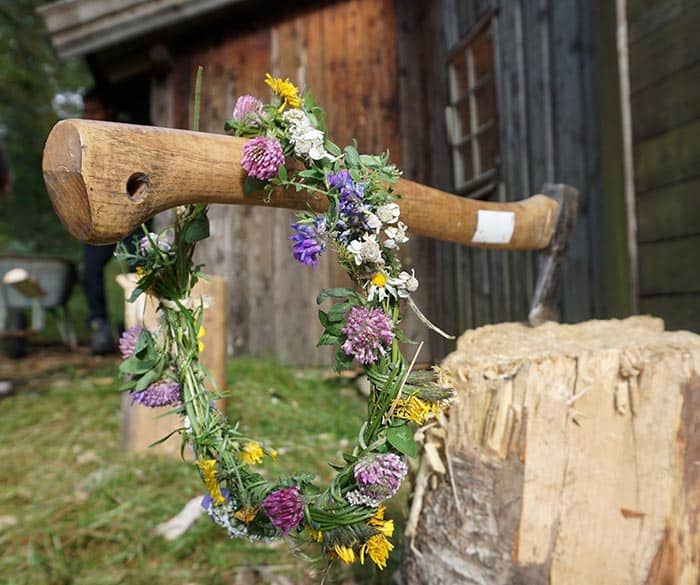
WEDNESDAY. Finally, we got to put our hands in the dirt. We pulled on overalls, rubber boots, and rode our bikes down to Nøst. Anton, our teacher, taught us why leeks and carrots should be planted side by side. (The smell of the leeks deters pests that prey on carrots.) And why fava beans are great partners with potatoes. (Fava beans are incredible Nitrogen fixators and they fill the soil with the nutrients that potatoes readily use up.)
We weeded rows of veggies and my friends simultaneously gave me a lesson in Norwegian. Amalie and the rest of my classmates are Scandinavian, but they speak fluent English when I need them too. They are patient with me and encourage me to try new words. The beauty of physical work and learning is that it breaks down language barriers.
I’m exhausted after today on the farm. But, now we are sitting by the bonfire, cooking dinner, and waiting for the sun to set over the misty fjord. Another day flew by. Feels like time traveling here.
THURSDAY. Woke up, already satisfyingly sore from the farm work, and fuelled up for another big day. We learned to scythe and dry the hay using a traditional technique, where poles are driven into the ground with wire strung between them (essentially like a low and layered clothes line). Then the hay is folded over the line so that the rain will only fall on the top layer, but the wind can blow throughout and dry the hay thoroughly.
We learned that the direction of the lines is extremely important. The hay should not face south, because it would be exposed to too much sun and thus loose its essential nutrients and it should be parallel to the local wind direction to optimize drying conditions.
After a day on the farm, we came back to a hearty meal and a fashion show consisting of clothes left behind by last year’s students. Reduce, reuse, recycle! I can tell there are some good stories behind these sweaters that smell like campfires and tar.
I snagged a raincoat after realizing my Gortex shell is no match for Trøndersk weather. It has been a cold summer here in Rissa, the crops have suffered due to a wet July. The air does not feel like the August air I am used to. It rains several times every day, so I have quickly learned to always be prepared! And, I have a new blossoming romance with wool sweaters.
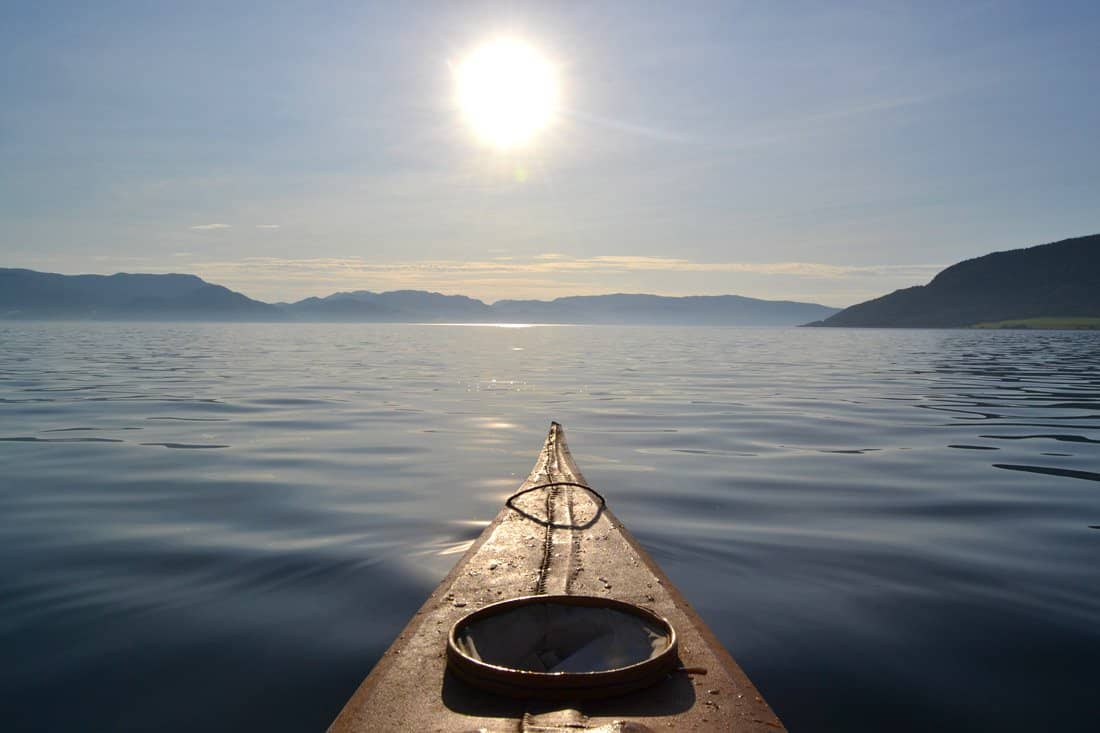
FRIDAY. We packed our gear and set out by bike, foot, and wooden row boat to Lefætten, the cabin in the hills. We hiked up through the woods and I took of my shoes to let the mud squish between my toes. It was quite the climb with a loaded pack, but we paused at the stream to fill our water bottles and look out over Trondheim’s fjord.
As the woods became denser we reached the cabin. It sat comfortably in a little clearing. There was already a hive of activity. We got working chopping, sawing, and stacking wood. I started today feeling like a bit of a newbie with an axe, but I am already feeling more familiar with the swish and swing motions.
We set up a lean-to and light a fire. Jeppe roasted wild mushrooms he had collected on the hike. This evening we are sitting under the shelter, the rain is drumming on the tarp, Kenneth is strumming his guitar and Will reads poems.
SATURDAY. We awoke to the sound of Kenneth singing and the smell of campfire coffee. We did a little dance to warm our toes and then got back to work! The wood stores for the winter are starting to fill up and we scythed the land to keep the forest from encroaching on the grazing space.
We ate lunch around the fire and then dawned our hiking boots and trudged back down the hill. But, instead of traveling home on foot, I hopped in the wooden boat and we rowed across the lake.
After we warmed up and dried off, we all huddled in the living room with craft projects, card games, and books while the accordion played down the hall. Then we ate (another!) meal and had barely enough time to digest before more dancing.
We danced Scottish tunes, a polka, and a Trøndersk tune until we couldn't feel our feet, and then we danced some more! I had no idea what I was doing, or which steps came next, but helpful hands spun me around and guided me when I was dizzy.
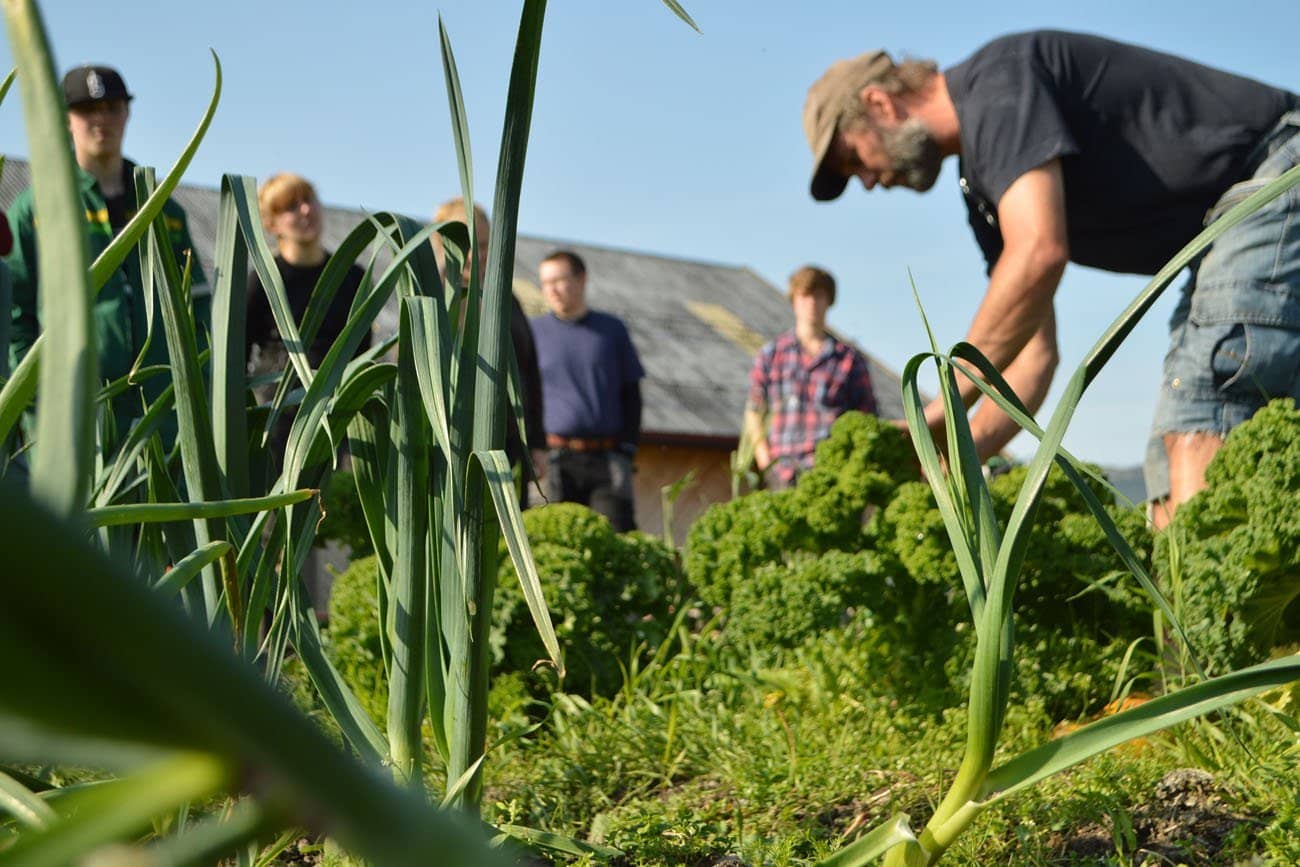
MONDAY. I began the week by watching the sun rise over dew-covered fields.
I am starting to get used to eating breakfast with sixty other people. It is hard to find time to be alone. I get energy from being around people, but this ‘school’ is a highly social place and one must be intentional with taking a break when necessary. It is all about finding balance.
Today, the whole school armed with buckets, climbed into the hills to collect berries. Some people took this chance to seek some space from the crowds. And the rest of us chatted as we separated blueberries from blackcurrants.
By the end of the day, we had collected enough blueberries, black currants and red currants to last us a year. We were covered head-to-toe with bright berry juice. Then, right on cue the local weather let loose a little rainstorm that washed away the sticky evidence of a successful berry harvest.
TUESDAY. The school is a frenzy of pack-sacs and mat-paks. Each class was getting ready for a week away. The boat builders are heading into the forest to fell trees for their projects, the sailors are going to catch the wind out past Trondheim’s Fjord, and the self-sufficiency group are hiking north to fish and stay in a Sami gamma.
My class is heading down to the farm, Nøst. A week feels like a long time to be away from our friends in other groups, but it will be a good opportunity to settle into a rhythm with my own classmates.
WEDNESDAY. I woke up with the sun and started the day with barn duty. Barn duty involves:
feeding, mucking out, watering and checking over every animal on the farm. It is a bit of a slog, but it gives us an incredible feeling of responsibility and pride in the farm.
Over the week, the animals became comfortable with our visits (three times every day), and we started to feel much more at home on the farm. It also brought our class closer - nothing fosters a friendship like scooping poop together.
We finished the day by thinning the carrot patch, and using the extras in a veggie curry - which we ate in the evening sun beside the horses, who were also enjoying their dinner.
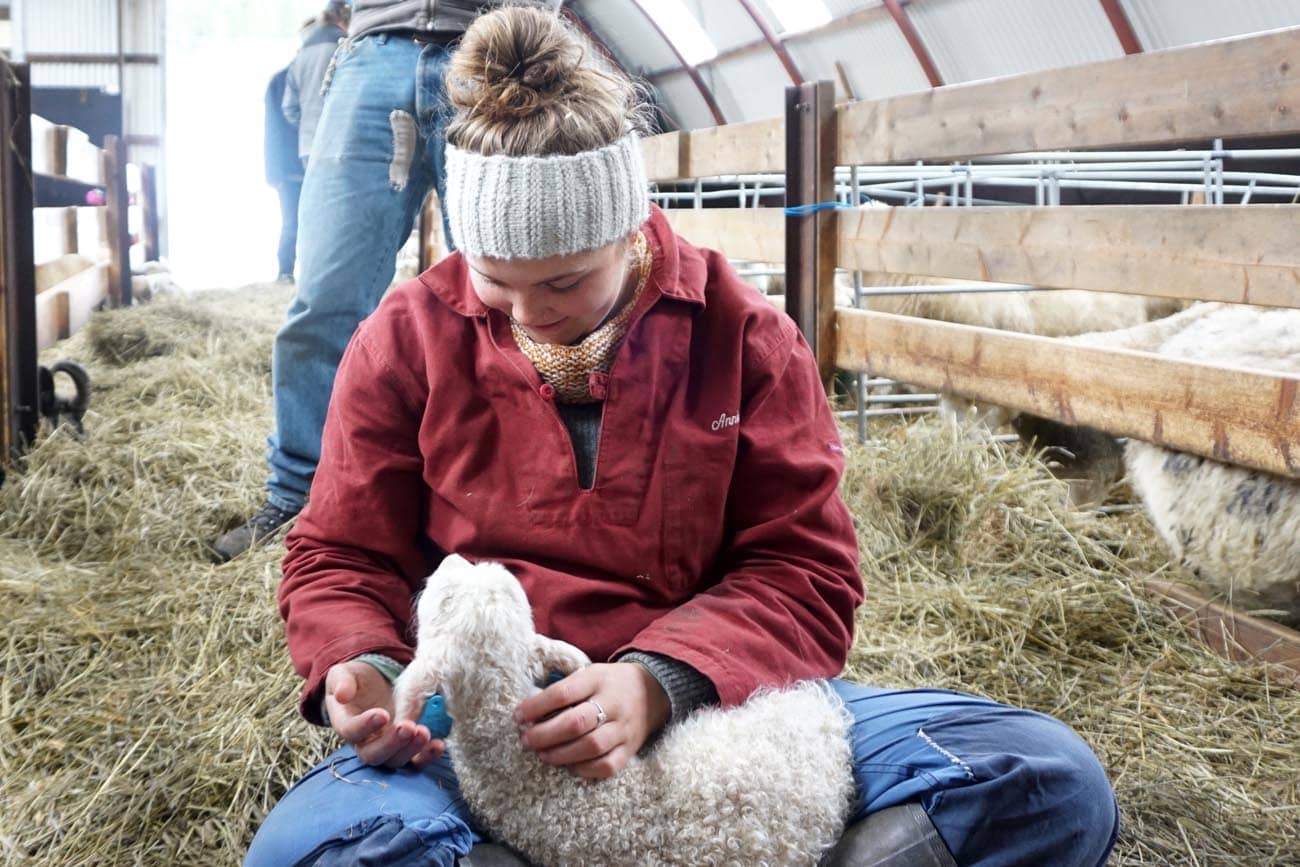
THURSDAY. Up early for barn duty with Amalie! Then we ate oat porridge for breakfast, a Fosen classic. We loaded our packs with equipment and then cycled around the lake and up into the hills.
As we hiked the path to the cabin, we listened to the clang of cow bells and the babbling of the stream. The day was spent creating fence poles from young birch trees and fencing in the grazing paddock around the cabin.
Mikala picked herbs for tea and we ate wild blueberries as our sandwiches toasted over the fire.
FRIDAY. We welcomed September with FarmHouse Banana Pancakes (essentially, a recipe consisting of no recipe, and instead a creative mix of what we had on hand). They were delish!
Anton taught a lesson in Compost theory. I’ve never seen someone so passionate about the subject. We learned how to balance wet & dry components of compost and then heading out to the barn for some hands-on learning.
SATURDAY. The whole school was reunited again. Regardless of age, nationality, & language, there is a shared enthusiasm towards life that shows, not only through contagious smiles, but also in the effort and pride devoted to work and craft. Though I only met them last week, it already feels like I have known them my whole life.
Everyone brought home stories from their excursions and we concluded the week with a bonfire. My clothes are starting to smell like tar, wood shavings, juniper smoke, and sheep. I love it.
SATURDAY. It has been a while since I wrote. My method of telling time is starting to shift from the traditional method using hours & days, to projects and treks. It has been 2 mountain hikes, one kayak trip, three pottery mugs, and half a pine bowl since my last update.
I am beginning to notice the sun duck behind the mountains a little earlier each night, and we have started exploring the outdoors with a little more urgency... trying to fit in every kayak tour and hike we can before the darkness comes.
The weather has treated us well, and we've been blessed with calm waters to try out the school's Greenland-style kayaks (constructed by former students using a wooden frame with fabric or skins stretched across).
On cooler evenings, we have taken to filling the wood fire hot tub and watching the skies for hints of the northern lights. Walking back to school one evening we caught a faint, flickering green ribbon, which stoked our excitement for the light show's forecast for this winter.
During the days, we have been hard at work harvesting various grains and crops. For example, we learned the sickle technique for harvesting rye. Also, we learned about the evolution of the thresher by starting with a simple pole and moving through the barn which could double as a museum for antique farm machinery. We've also been harvesting onion, fava beans, apples, and carrots.
On the weekends we have taken on the local mountains seeking a view of our 'kingdom' from above. The rock faces are similar to our hills at home, but the underbrush and mosses covering the ground are much more colourful. A mix of light blue lichen and deep red blue berry bushes give the mountain sides incredible texture. Further, the leaves are beginning to give in to the fall weather and are beginning to show hints of orange.
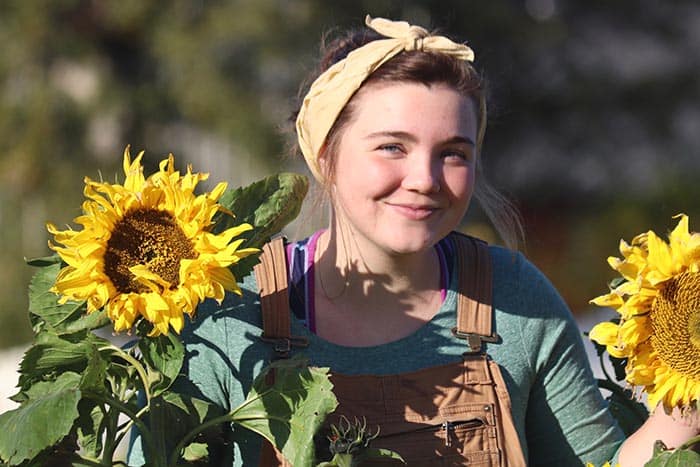
SATURDAY. This little world is like a whirlwind. It has been weeks since I sat down to write. This week I learned the true value of team work, and of the potato.
The whole school spent the week on their hands and knees in the potato patch sifting for 'gold'. We worked in the sun and rain driving our horse team up and down the field, while an army of local children and Fosen folk ran behind collecting potatoes. The whole while, our fiddle & accordion duo serenaded the potato fields.
After a muddy yet rewarding week in the mud, it was time to celebrate! We cleaned out the barn, collected hay bales, and made tables from old doors. After feasting, we danced the night away and then ended the week with a sleep over in the hay loft.
MONDAY. We set sail on Sunday, with the sun on our faces and a steady breeze at our backs. Braute, an Åfjords fembøring boat, was the oldest member of the fleet. She has an ancient sail that has been soaked in tallow so many times that it glows red when the sun shines through it. She carried us on a steady course to our island destination.
The journey went by quickly, as we were entertained by Kenneth’s guitar, several bars of chocolate, and learning to tack on the big boats.
When we reached the island, the sun was low in the sky and the water was calm. We rowed into a bay and set anchor beside the other boats.
The island was enchanting. A grassy glade welcomed us on the island and the forest, now changing to oranges & reds, formed a warm border around camp. The sandy bottom made the water appear bright turquoise & almost Caribbean.
We were also welcomed by a choir of 'baaaah's coming from our flock of wild sheep. We sent our most energetic scout, Bjørnar, out across the island to locate the flock and report back. We stayed close to camp as the sun went down, so as not to disturb the flock. Around the camp fire we grew restless and excited for the next day's sheep wrangling extravaganza.
We slept in the ships cabin, with the waves rocking us gently to sleep.
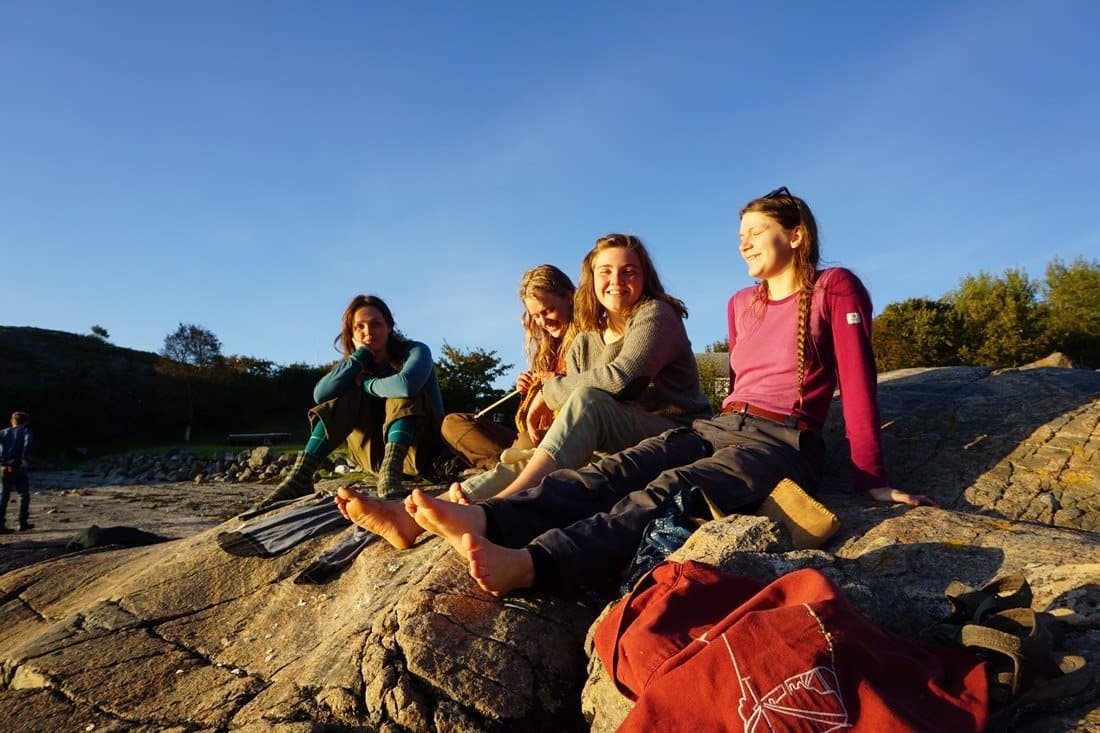
TUESDAY. We woke up with the sun and filled up with a healthy dose of oatmeal and brown cheese. Then it was time for action. We gathered around the teachers, who had constructed a map of the island from rope and twigs. They proceeded to explain the game plan (reminiscent of a rugby play), by using dried sheep droppings as pawns (only at Fosen).
We split into groups: some runners would flush the sheep into a small field flanked by rocky edges, where the others would be waiting to join the scrum and direct them into a make shift paddock we constructed.
We managed to capture about 25 sheep in the first round, however some clever sheep broke through our line and were now spread across the island. Needless to say, we had a busy day ahead of us.
By dinner time we had captured the whole flock. A couple of us were recruited to weight and access the sheep's teeth, wool, and overall health. Our wild sheep variety has a beautiful mix of shades in their shaggy wool and overall the flock was very healthy.
We picked about 2 dozen sheep who were starting to show signs of age. The 'chosen ones' we loaded onto our ship and readied for the sail back to school. Next week, we will be learning slaughter techniques and saving different parts of the animals, such as the organs and skins for tanning later in the year.
As the sun set on another day at the island, several of us climbed to the top of a rocky out cropping. There we had a perfect view of the watercolour-sky and soon the stars.
We concluded the day with a most magical tooth brushing session. When we dipped our brushes in the sea, the water lit up with phosphorescence. Bright blue sparkles! What a perfect sight to conclude a perfect day. I am exhausted and still adjusting to my sleeping mat and trying to stay warm in this coastal climate.
SUNDAY. As people at home celebrated thanksgiving weekend, Catriona and I settled ourselves into the farm house at Nøst. We had a week with free time and a wood burning stove - can it get any better?
We woke up with the rest of the farm, each morning, and spent some time with the animals (leading the horses out to their pasture, feeding the pigs, and picking the eggs). After we were sufficiently muddy, we picked some veggies then retreated to the little cabin and made an assortment of amazing breakfasts.
Our afternoons were spent cycling around Rissa, sitting on a pier and carving into the sea, or cuddled up listening to audiobooks with the fire on. Each evening after we put the animals to bed, we sat around the table for a well-earned home cooked meal.
Though it was a cozy and restful week, it felt so strange to be away from the rest of our friends. And we took the first opportunity we could to return to school and settle back into our workshops and projects.
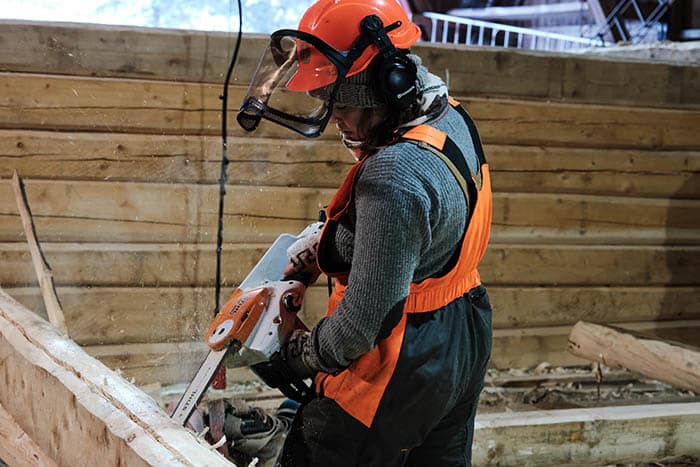
WEDNESDAY. Back at school after fall break. Our week has been filled with new skills! Lena taught us the tried and true method of navigating by the sun. She showed us how to use a sun stone & sun compass.
After her lesson, I was inspired to take on more sailing. Over the last few weeks our wee outings on Botn have become more and more enjoyable and I am starting to understand the ropes and methods specific to our square sails.
A less traditional skill I learned this week was chainsawing. We spent a day taking old planks from the boat workshop and prepping our wood pile for a winter full of fires.
- Annie
Want to read more? Here is Annie's letter to future Fosen students: